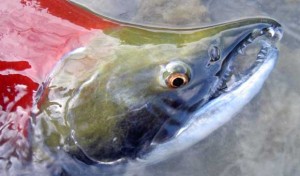By Gabe Scott, Alaska Legal Director
CORDOVA, AK— Frankenfish may be coming to a store near you, but not if we can help it.
Last week's decision by the Food & Drug Administration to approve Genetically Engineered Salmon for sale in the United States is hugely important. There are a lot of moving pieces and unknowns, so here’s the low-down.
What are Frankenfish?
The fish is basically an Atlantic Salmon spliced with genes from Pacific King Salmon and a deep-sea fish to make it grow faster. A company called AquaBounty Technologies makes these fish at a facility on Prince Edward Island, just off the Fortune River in Canada. They are grown out in a land-based fish farm along a small Pacific river in Bajo Mono, Panama. With FDA’s approval, they can now do this all commercially, and sell them as regular salmon to consumers in the United States.
The AquaBounty operation is legally classified as a new “animal drug,” and was evaluated by the FDA Center for Veterinary Medicine. Wait, fish farming frankenfish is considered an animal drug? Yep. So there’s your first clue the government is behind the eight-ball when it comes to dealing with new biotechnologies.
This specific approval for a few ponds in Panama is just the beginning. The decision is the first of its kind, the first time any GE animal has ever been approved for human consumption.
The “AquAdvantage” salmon line is owned by AquaBounty Technologies, which in turn is owned by the global biotech conglomerate Intrexon Corporation (“A better world through better DNA”). Based on how the fish are designed and the company’s own statements, many observers fear that AquAdvantage salmon are destined to be raised in ocean net pens.
In spite of pleas from consumers, FDA also determined that the fish do not need to be labeled.
And, at the same time they approved AquAdvantage salmon, the FDA also rejected two legal petitions relating to the inadequate regulatory processes for protecting consumers and the environment.
What is the problem with frankenfish?
There are a myriad off issues with genetically modified food, but the core problem is that the government regulators are flying blind. Rather than squarely address risks of contamination of wild stocks, disruption of wild fish markets, or health issues for consumers, genetically engineered animals are being green-lighted under a tortured reading of obscure and out-dated regulations.
For example, they have flatly refused to consider economic impacts of their decision. This in spite of overwhelming opposition from the salmon industry. Wild salmon economies work because the product is a green, high-value healthy food. What will happen to those markets when consumers have to worry whether the fish on their plate is a frankenfish?
The agency also refused to consider any long-term or cumulative impacts. That’s preposterous for AquAdvantage salmon. The obvious plan is for them to be raised in ocean net pens on a wide scale— the venture makes no commercial sense, otherwise.
Because it’s a new technology, we don’t know much about how GE fish might impact the environment. But it does raise significant questions and justified fears. Among them:
-
Escaped fish interbreeding with wild salmon, trout or another species;
-
Health risks to humans;
-
Economic effects. Harming the domestic fishing industry;
-
Animal welfare.
What are we doing about it?
A lot!
Opposition to “frankenfish” has been strong, in fact almost universal, in salmon territory (largely synonymous with Cascadia). It is notable that some of the strongest opposition is coming from “Salmon Nation,” from those of us whose livelihoods and culture are intertwined with salmon.
Cascadia is committed to using every legal tool available to stop this irresponsible decision. The bedrock environmental laws we regularly apply to timber sales, the “look before you leap” rules like the National Environmental Policy Act, are well-suited to reign in reckless projects such as this.
Other national and international organizations are actively engaged as well, notably the Center for Food Safety, Friends of the Earth, and EarthJustice.
At the grassroots level, Cascadia and our partners Mountain Rose Herbs took a leading role in the campaign for GE-free seafood, signing up groceries to take the pledge not to sell frankenfish. You can see the list of fish suppliers who took the pledge at: http://www.foe.org/gefreeseafood
Even our politicians have gone to bat, although so far they've failed to make any hits. The Alaska legislature passed legislation banning the fish from the Alaska, and passed a resolution specifically opposing AquAdvantage salmon. In Washington D.C. Alaska’s congressional delegation, notably Lisa Murkowski and Don Young, have been vocal and strident in opposition, introducing several pieces of legislation and conducting hearings. Senators and representatives elsewhere in the Pacific Northwest are also vocal opponents.
Commercial fishermen have been active. The lack of labeling especially raises fears that wild salmon markets will be affected.
Whatever the right decision about genetically modified salmon, it is an important decision. The consequences should have been thought through. That is why us Cascadians are sure to continue leading the fight to demand that our interests— that the salmon’s interests— are not ignored.
To remain involved, here are three tips:
1. To avoid eating frankenfish, shop at suppliers who have committed not to sell them. Grocers can also take the pledge, and refuse to buy any salmon with a country of origin “Panama.” Visit http://www.foe.org/gefreeseafood to see who has taken the pledge.
2. For fishermen, processors, groceries and restaurants, knowing where your fish comes from will become more important.
3. Help support litigation challenging frankenfish by donating to Cascadia Wildlands! Also, any Cascadia members who have spent time on Prince Edward Island, or western Panama, and are interested in helping with litigation, please be in touch with our legal director, Nick Cady, nick(at)cascwild(dot)org.
(Spawned out red salmon, Copper River. Photo origin unknown)



